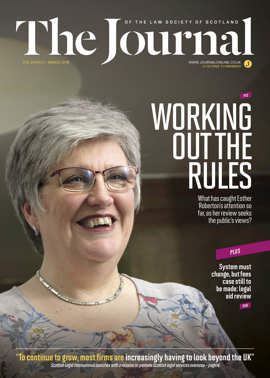The game's not a bogey!

I wrote my first article for the Journal in November 1995. Its title was “The game’s a bogie? Job satisfaction in professional life”. Not surprisingly, this continues to be an important issue for all lawyers.
Most people want to have a professional career that provides job satisfaction and personal success. Each generation has its own picture of what life as a lawyer will be like. For some of us that will be Atticus Finch or Horace Rumpole; others the partners in Ally McBeal, The Good Wife and Suits. As a result, legal education and training is tasked with developing in every new entrant the whole entity of a “good lawyer”. This includes the “head”: the legal knowledge provided by the law degree; the “hand”: the skills developed in the DPLP, traineeship and early years of practice; and the “heart”: the ethics and empathy, which in my experience cannot be grafted on but must be an inherent part of each individual who sets out to become a good lawyer.
In this swan-song article, I want to provide a positive message for the future of the profession of which I have been a member for more than 40 years – being an active member of a supportive legal community can continue to bring business success and personal satisfaction.
External pressures
Solicitors are major players in the economic success of all countries. Applying knowledge, skills and abilities to achieve high quality solutions tailored to each client situation is the lifeblood of good professionals. While commoditisation and IT systems have changed the technical content of our jobs, there is still a need for our interpretative and problem-solving skills as qualified lawyers to deal with work that is complex and high risk, and as a result requires professional judgment and personal resilience. Acting for clients whose expectations and resources may be unrealistic involves complex relationships and considerable skills in communications, problem-solving and risk management.
Recent changes in the marketplace have forced a rethink about the delivery mechanism and resource base of many professional services. This is causing considerable tension and a loss of faith among some who feel that their organisations no longer value what good professionals do. In my view, this is an oversimplification of a market-driven response to increased commoditisation, spending cutbacks and buying services online.
There are two distinct aspects to this: first, the professions have to accept that the way they used to deliver some of their services is no longer viable; and, secondly, clients will always need expert, consistent and practical advice and support. The market is not demanding that we reduce the quality of that service; rather that we change the way it is delivered. Online products and support seem to be the way forward and professional organisations will need to decide how they will position themselves in relation to this trend. However, I would caution against too much remoteness from our clients, as they will always be the ones providing the brief and asking for innovative solutions.
Clients do not always know what they want or the range of options available to them, and they sometimes want to do something that is contrary to their best interests. They will therefore need professionals who listen to them and are able to identify what they actually need. Good lawyers are great problem-solvers. This requires the skills of persuasive communication and assertiveness as well as the ability to exercise individual judgment and create trust.
Another change that is having a direct impact on the morale of all the professions is increasing external regulation and compliance. This has been brought in to improve the public perception of the robustness of investigations into inadequate professional service delivery, and many professionals think that these external regulators do not fully understand the pressures that practitioners work under on a daily basis.
I think that there is some merit in the resentment that good professionals feel when someone outwith their area of practice attempts to assess the quality of their work. The complexities of professional practice result in subjective judgments being made based on years of experience, and it is therefore difficult, if not impossible, for someone not steeped in this type of practice to assess whether the “correct” decision or action was taken. However, external quality assessment is now part of professional life, so people should focus on the benefits this can bring, including being able to use it to import objective and overt standards, rather than bemoan its imposition. It does, however, mean that professionals will have to become more resilient and accustomed to external criticism.
The game is not a bogey – a vibrant community
On my retirement, I want to leave a positive message for my colleagues. I have been a member of the Law Society of Scotland for over 40 years and I have always cared about my profession. I hope that the work I have done on its committees, in helping law graduates make career choices, training trainees and new entrants as they enter practice and enabling firms to be more effective and successful, reflects my commitment to it. I believe that the key to professional success is resilience and judgment, and that both can be taught and developed over time.
To have a successful professional career, we need to develop our personal resilience, as so much of our work depends on our ability to make complex and difficult decisions quickly, often with incomplete information. As a result, we need to learn to rely on our intuition and exercise good judgment based on our experience of professional practice working alongside colleagues who trust and support us. We need to develop confidence in our own abilities and build resilience to practise a craft where there is rarely a “right” answer, only the best answer for that specific situation.
We also need to be true to ourselves. We will have chosen our discipline because it is important to us and because we want to work in a profession where individuals do their best and take personal responsibility for that. We will therefore have values in common with our colleagues that provide us with a frame of reference to discuss problems, evaluate options and make decisions. Experienced people are prepared to spend time and energy helping and inspiring younger people, as they represent what the profession stands for and as a result are role models that other people follow in relation to their behaviour and attitudes. This enables new entrants to feel that they have made the correct career choice for them, and to feel a commitment to become a lawyer with all that implies in relation to helping clients resolve disputes, providing access to justice and representing the rights of the individual in relation to dealings with others and the state.
Professional practice can bring a sense of self-worth, based on a vocation to do a good job and help other people. It provides a career path that leads to “mastery” and personal independence, financial rewards and recognition of expertise. At times, this can be challenging and the exercise of judgment exposes practitioners to taking personal ownership for a decision that lies in the grey area of what is realistic and achievable in that specific set of circumstances for that particular client. This requires courage, determination and integrity.
A great deal of the support needed to develop this ability can be found in a community of practice, which is an integral part of every professional discipline. Not only does it set standards of performance, it invests in the training of new entrants and enables people to share and develop established practice.
In my view, being a professional is more than being highly skilled and knowledgeable – it involves a commitment to continuous improvement, whether in relation to personal development or training new entrants, so as to sustain personal fulfilment and a vibrant community.
In this issue
- Borrowings, partner capital and profitability
- GDPR and the cloud
- Employment claims: is the flood still to come?
- Contributory fault: drivers, cyclists and pedestrians
- Reading for pleasure
- Opinion: Derek McCabe
- Book reviews
- Profile: Siobhan Kahmann
- President's column
- Application changes coming
- People on the move
- Seeking a better way
- Beyond borders
- Drawings and profitability
- Enforceable rights or progressive policy goals?
- Conflict theory: it works
- What the liquidators don't tell you
- The office on the move
- Please can we have some more?
- Health check for doctors' lines
- When creditors come first
- Keeping goods exclusive
- Tenant Farming Commissioner: the story so far
- HSE appeals: experts allowed in
- Scottish Solicitors' Discipline Tribunal
- Please don't stop the music
- Broadcasting's business end
- Public policy highlights
- Scam warnings escalate
- This time it's personal
- The game's not a bogey!
- "Only amateurs attack machines; professionals target people"
- When estate agents need client ID
- Banks, client accounts and the Money Laundering Regulations
- Third party rights: what now?
- Ask Ash






